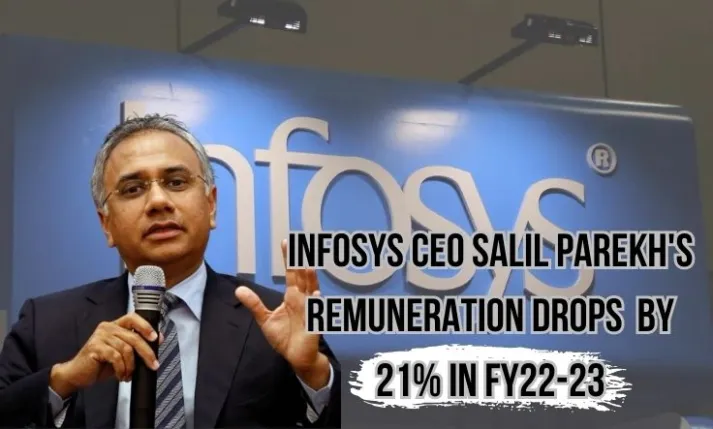According to the company's annual report, which was made public on Friday, Salil Parekh, the chief executive of Infosys, saw a reduction in compensation of 21% for the FY 2022–2023. Parekh's overall salary, according to Infosys, India's second-largest software exporter, was Rs 56.4 crore, down from the previous year.
The discrepancy was brought about by fewer stock options being exercised this year than previous. As he exercised 1,24,783 stock units under the 2015 stock option plan and 73,962 units under the 2019 plan during the previous fiscal year, Parekh's pay included Rs 30.6 crore in stock options. The salary also contained a variable component at Rs. 18.73 crores and retirement benefits worth Rs. 45 lakhs.
Parekh earned Rs 71 crore in the year prior, which ended in 2022; this sum included Rs 52.33 crore in the stock option exercise.
This contrasts with his Wipro colleague Thierry Delaporte, whose pay decreased 5% annually in dollar terms to $10 million (or Rs 83 crore) in FY23, according to filings with the US Securities and Exchange Commission (SEC) that were made public last week. The salary for Chairman Rishad Premji also decreased by 50% in dollars from the previous year to $951,353.
Interestingly, Infosys' executive chairman and non-independent director Nandan Nilekani did not receive any compensation for the year. Nilanjan Roy, the company's chief financial officer, saw a 28 percent raise in pay, bringing his total salary to Rs. 10.61 crores. Mohit Joshi, who resigned from his position as president in March, was paid Rs 57.3 crore and became CEO designate of Tech Mahindra.
Also, read Zomato shares jump nearly 8%
Co-founder Nilekani stated in a letter to shareholders that the world was "suffused with uncertainty" as its defining characteristic.
"What's in front of us is a rapidly erupting, unpredictable cocktail of inflation, interest rates, geopolitics, conflict, demand volatility, supply chain disruptions, and the transition from efficiency to resilience and security. Depending on the day's news, we may swing back and forth between caution and optimism in any given week,” the chairman of the IT major wrote in the letter.
Nilekani acknowledged the drawbacks and difficulties brought on by disruptive technologies. He highlighted concerns related to AI hallucination, systemic biases, lack of explainability, and various practical, ethical, and intellectual property-related issues that remain open for debate.
In his letter to the shareholders, Parekh stated that over the previous few quarters, the global economy has dealt with issues including inflation, rising interest rates, and shifts in the demand environment for businesses across a range of industries. "Our strength in digital, cloud, and automation, together with our capacity for cost optimization, have kept us well-positioned.In the changing economic climate, these will continue to play a crucial role, he said.
— Harshita Kumar
Must read, The Story of Chai Sutta Bar’s Founder







